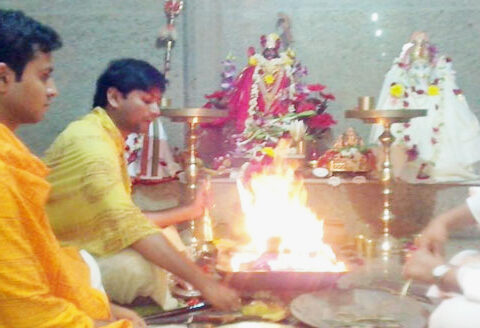Glossary 2

-
Pandit
~~~ Pandit refers to a Hindu who has memorized a substantial portion of the Vedas, along with the corresponding rhythms and melodies for chanting religious verses or singing them during prayers or rituals. In modern times it broadly refers to a scholar, an expert and authority in a certain field. [caption id="attachment_3303" align="aligncenter" width="480"] Pandit[/caption]
Pandit[/caption] -
Para Bhakti
Para bhakti is a Sanskrit term referring to devotion that transcends all worldly concerns and is pure, transparent and simple. It generally refers to devotion to the Divine, or God, and is a supreme state of love and respect.
-
Pitris
The Pitris (Sanskrit: पितृ, the fathers), are the spirits of the departed ancestors in Hindu culture. They are often remembered annually. -
Pranayama
Pranayama in Hindu Yoga is the regulation of breath through certain techniques and exercises. It is a conscious prolongation of inhalation, retention and exhalation. 'Prana' pronounced 'Praanaa' is the Life Energy, both individual and universal. If breath is controlled, mind is controlled and becomes quiet and vice versa. It is used as an aid to meditation, relaxation, calming the mind and general health.
-
Prapatti
Self-Surrender; Surrender to God.
-
Prarabdha
Prarabda is one's destiny to be worked out in this life, resulting from the balance sheet of "results from actions" in past lives. There are three kinds of Karma (actions and results from actions). Prarabdha, Sanchita and Agama. Prarabdha Karma is the Karma currently being lived and worked out, resulting from past actions and desires. Sanchita Karma is the accumulated "results of actions" to be played out in due course. Agama Karma is the Karma that is created by the way one lives the current life, by the prospective results of one's actions and the desires they retain.
-
Prasad
Blessing from God or Guru; the food or drink that is offered to the devotees after being used for worship of God. -
Purusha
Person; Man -
Purvapaksha
Previously achieved; so far attained
Conversations with Ramana Maharshi are rare and priceless. He seldom wrote anything on his own accord. But out of His immense kindness and love, sometimes he answered questions from Devotees on Meditation, Devotion to God and Life. Reading them, contemplating on them and try to practice them are bound to offer great guidance to every true seeker of Real Happiness.
Sometimes Sri Ramana Maharshi used words in Sanskrit or devotional words and scriptural texts. This Glossary provides some insight into those.

